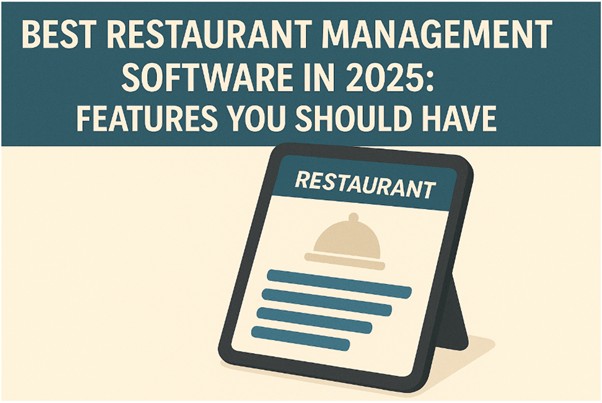
Best Restaurant Management Software in 2025: Features You Should Have
The restaurant industry is evolving rapidly, and technology plays a crucial role in streamlining operations, improving customer experiences, and boosting profitability. With an increasing number of restaurants embracing digital transformation, selecting the right restaurant management software is essential for success in 2025. Chef Shajahan M Abdul, a renowned industry expert, highlights that modern restaurant software solutions go beyond basic POS systems—they integrate inventory management, customer relationship management (CRM), AI-driven analytics, and even automation features.
Drawing on insights from Restro Consultants Pvt Ltd (RCPL) and leading restaurant consultants, this article examines the top restaurant management software solutions for 2025 and the essential features that ensure operational efficiency.
Why Invest in Restaurant Management Software?
A powerful restaurant management system simplifies order processing, staff scheduling, menu optimisation, and customer engagement. By automating these processes, restaurant owners can focus on enhancing service quality, profitability, and staying ahead of their competitors.
“The right software can be a game-changer for restaurant businesses. It ensures smooth operations, reduces costs, and provides valuable data-driven insights,” says Chef Abdul.
Top Restaurant Management
Software in 2025
1. Toast POS
A leading cloud-based POS
system, Toast offers all-in-one restaurant management solutions, including
online ordering, real-time analytics, and payroll management.
2. Square for Restaurants
Square’s intuitive interface
and affordable pricing make it a preferred choice for many independent
restaurant owners.
3. Lightspeed Restaurant
Designed for full-service
restaurants, Lightspeed offers advanced inventory tracking and omnichannel
capabilities.
4. TouchBistro
A highly customizable
iPad-based POS system, TouchBistro focuses on enhancing the guest experience
and improving front-of-house operations.
5. Pet Pooja
A popular restaurant software
solution in India, Pet Pooja offers a feature-rich platform tailored for local
businesses.
Must-Have Features in
Restaurant Management Software
1. AI-Powered Data Analytics
Modern restaurant management
software should utilise AI to analyse sales trends, predict customer
preferences, and deliver actionable insights to optimise revenue.
“With AI-driven analytics,
restaurant owners can make data-backed decisions that improve
profitability,” states Chef Shajahan M Abdul.
2. Cloud-Based Access
Cloud technology enables
restaurant owners to access real-time business insights, monitor operations,
and manage activities from anywhere.
Restro Consultants Pvt Ltd
(RCPL) recommends cloud-based solutions for scalability, security, and ease of
access.
3. Integrated Inventory
Management
A robust inventory tracking
system prevents overstocking and reduces food waste by monitoring real-time
ingredient usage.
Restaurant consultants
emphasize that restaurants using AI-integrated inventory systems see a 20-30%
reduction in food waste.
4. Seamless Online Ordering and
Delivery Management
With the growth of online food
delivery, restaurant software should integrate with Swiggy, Zomato, Uber Eats,
and direct-order websites.
5. Customer Relationship
Management (CRM) & Loyalty Programs
A built-in CRM system helps
track customer preferences, send personalized offers, and improve retention.
“Restaurants that
implement loyalty programs with CRM integration experience up to 25% higher
repeat business,” notes Chef Abdul.
6. AI-Powered Chatbots for
Reservations and Customer Support
Chatbots enhance customer
service by automating tasks such as reservations, answering frequently asked
questions (FAQS), and taking orders through messaging platforms.
“AI chatbots are
transforming how restaurants engage with customers, ensuring instant responses
and better service,” explains Chef Shajahan M Abdul.
7. Staff Scheduling and Payroll
Management
Efficient workforce management
tools ensure proper staff allocation, shift scheduling, and timely payroll
processing.
Restro Consultants Pvt Ltd
(RCPL) highlights that restaurants using AI-driven scheduling software
experience up to 40% improved workforce efficiency.
8. Multi-Channel POS Integration
A modern POS system should seamlessly
support in-house dining, takeout, and online orders while integrating with
accounting tools like QuickBooks.
9. Voice and Contactless
Ordering
Restaurants in 2025 are
expected to adopt voice-activated ordering systems and QR-code-based
contactless payments to provide an enhanced guest experience.
10. Kitchen Display System
(KDS) for Efficient Order Management
A KDS streamlines kitchen
workflows, reduces miscommunication between staff, and ensures smooth food
preparation processes.
Choosing the Right Restaurant
Management Software
When selecting a restaurant
management solution, consider the following:
Conclusion: Future-Proof Your
Restaurant with the Right Technology
As the restaurant industry
moves towards a tech-driven future, investing in the right restaurant
management software is critical for long-term success. Whether AI-powered
analytics, automated inventory tracking, or contactless ordering, adopting
these technologies can help streamline operations and enhance the customer
experience.
“The future of restaurant
management is about intelligent automation and seamless integration of digital
tools,” concludes Chef Shajahan M Abdul. “By choosing the best
software, restaurants can optimise efficiency, reduce operational costs, and
stay ahead of the competition”
Consult Restro Consultants Pvt Ltd (RCPL) for expert guidance on restaurant technology solutions. Their team of experienced restaurant consultants can help you find the perfect software to match your business needs. Contact RCPL today to future-proof your restaurant with the latest digital innovations!
Chef Abdul © Copyright 2024. All rights reserved.